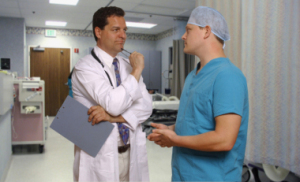by
Brendon Nafziger, DOTmed News Associate Editor | March 28, 2012
Randomized clinical trials are the bedrock mechanism of modern, evidence-based medicine - randomly shuffling a patient into one of, say, two treatment modalities, and later comparing the results.
Should such studies be done on proton therapy? Two doctors debated this recently in the pages of the journal Medical Physicists.
Protons, protons, protons




Ad Statistics
Times Displayed: 45002
Times Visited: 1379 Keep biomedical devices ready to go, so care teams can be ready to care for patients. GE HealthCare’s ReadySee™ helps overcome frustrations due to lack of network and device visibility, manual troubleshooting, and downtime.
Proton therapy has been around for decades, and is very expensive. Centers can cost hundreds of millions of dollars to build, and patients or their insurance plans can expect to pay thousands for a course of treatment. But advocates say it's better than traditional, photon (X-ray or gamma ray) based therapies because of the physical nature of protons. When they're zapped into the body, the radiation dose is very high at the target - say, the tumor - but as you move away from it, the dose falls rapidly, thereby exposing healthy tissue to less radiation than with other techniques. That said, no randomized controlled trials directly comparing photons to protons have ever been completed, according to the new paper, published March 8.
For Dr. Hideyuki Sakurai, the director of a proton medical research center at the University of Tsukuba in Ibaraki, Japan, that's OK. Taking the pro side for the question, "We do not need randomized clinical trials to demonstrate the superiority of proton therapy," Sakurai outlined some ethical and practical objections to running RCTs.
We don't need no RCTs
For one, it's not appropriate ethically because science already knows the main difference between the two treatments and what we could expect from a study. "There is no medical rationale for such RCTs because it is known that protons deliver lower doses to non-target tissues than do photons for the same specified dose and dose distribution to the target," he wrote. "RCTs to provide answers to questions that can be readily answered by simple planning comparisons are not necessary."
For another, RCTs would be hard to carry out. It would be time-consuming to recruit the number of patients necessary, as there are so few proton therapy centers around for them to be treated at. There are in fact only 10 such centers in the U.S., with the
most recent one only opening last week. Also, the cost would be high, especially where, as in Japan, patients would need to pay out-of-pocket for the studies. He does note one study, a phase 2 RCT comparing photons versus protons for adult lung cancer patients, is underway at M.D. Anderson in Houston. But in this, after the results come in from the first round of treatment, patients can be reassigned to another treatment wing.

